Polar Maid
Voyage
by Dennis M. Crosby
In the middle of December of 1949 I
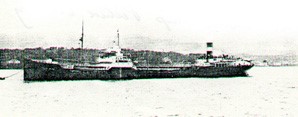
The SS Polar Maid
ex-Steaua Romana, ex-Emil Georg Van Strauss,
ex Olex. Please visit the SS Polar Maid
page on the Norwegian South Georgia Whaling
website Paa Feltet for more information.
|
joined an Oil Tanker in
Manchester. The vessel was owned by
Christian Salvesen of Leith
and had just
discharged a cargo of Whale Oil.
Anyone who has ever smelled whale oil,
can never ever forget its pungent aroma.
It is nearly strong enough
to chew!!
The ship was named
Polar Maid.
The Deck & Engine room crew all lived for'rad in the
Forecastle Head and it
was probably the most primitive
accommodation I experienced in my six years of "Seafaring".
We eventually set sail to load a full cargo of fuel oil destined for
the Whaling Fleet operating out of the island of
South Georgia.
Our
port of
loading was to be
Abadan,
a major oil port in the
Persian Gulf.
Whilst on passage through the
Bay of Biscay,
we experienced problems
with the ship's engines and after repairs being carried out by the
Engine room staff, we eventually limped into
Gibraltar on Christmas
Eve. Further repairs were carried out during the week and finally we
sailed
on New Years Day. Unfortunately while passing through the breakwater,
the vessel struck something which required us returning into port
and
causing another two days delay.
After finally reaching Abadan and spending three days loading,
we set
sail for Durban, South Africa.
To anybody unfamiliar with Abadan, suffice it to
say, it is a
little warm there, to say the least! Temperatures of 120F
and above being the norm. Any forseeing person who would open an
Ice Cream Soda
bar there would make his fortune.
After sailing for two weeks or so,
we eventually reached Durban.
During our passage
"Chippie", the ships Carpenter,
had been hard at work
each day constructing several wooden pens in the ship's stern to
accommodate several large pigs which we were to take on board for
passage down to the "Island".
We arrived at Durban during the afternoon,
began taking on bunkers
and provisons and were informed that we would not be sailing until
the
next day,
which allowed those that so wished,
to spend an evening
ashore. This worked well for me because it allowed me to make a
phone call
to my Parents who were at that time living in
Port Elizabeth,
having emigrated there in 1948, and who were to be celebrating their
25th Wedding
Anniversary in several days time.
We sailed again the following morning, together with our newly
obtained passengers, the pigs!
Within a week we were deep into
"The Roaring Forties" where the
seas at times appear to be volcanoes
and the wind howls and screams and the ship pitches and rolls, and
one repeatedly asks ones self "What the hell am I doing here?"
The
vicious seas washed away several of the fittings off the Forecastle
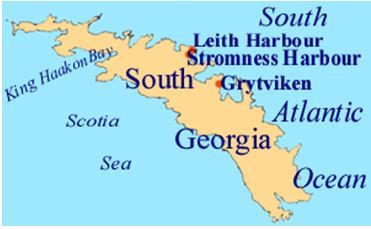
Although this most southerly outpost of the British Empire was
hostile to man,
South Georgia was surrounded by an ocean
which was home to amazing numbers of fish,
seabirds, seals, penguins and whales.
|
and water began to steadily leak into our accommodation,
causing
about
6-8 inches of water to slosh about the deck below our bunks with
each roll of the vessel.
The bulkheads were continually running with
moisture and the heating eventually "gave up the ghost",
not endearing any of us at all towards the ship.
Large and small ice-bergs eventually began to appear --
luckily the ship was fitted with
Radar and so great care was given
to keeping
vigilance.
Not a very enticing place to visualize colliding with an Ice cube!!
After suffering great discomfort for many days,
we eventually arrived at
South Georgia.
To say that this island is a desolate spot,
would be a
vast exaggeration. I think that even God himself must have forgotten
that he created the place!
We off-loaded our cargo in
Leith Harbour,
the main installation there, the other being
Stromness.
Several large wooden buildings contained
various machinery and large pressure cookers all used in the
process of extracting the whale oil from the whales brought to
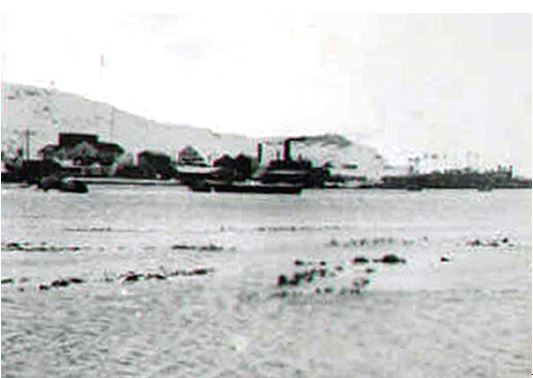
Dennis took this pic of the
Leith Harbour waterfront after
Polar Maid's
arrival.
|
the island by a
large fleet of catchers.
The two
factory-ships
which were usually there for the fishing
season, had departed for their return to the
U.K. and
Norway
a week before our arrival.
The catchers were allowed to fish for a further six weeks after
the departure of the factory-ships,
bringing their catches to
the island.
There was
a large, long wooden ramp with a powerful winch situated
at the top of the ramp.
Each whale was hooked onto a cable and winched slowly up
the ramp,
while the "Flensers"
men with long knives shaped like a hockey stick,
quickly sliced off large hunks of the whale's meat.
This was then
towed to the pressure cookers for rendering down for the oil.
|
Dennis Crosby's
South Georgia
Photo Gallery
|
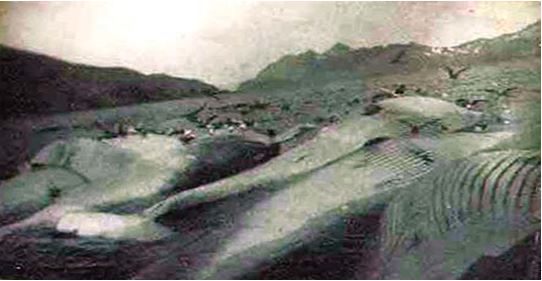
|
Many seabirds were attracted to the harbour by
the remains of the flensed whales.
|
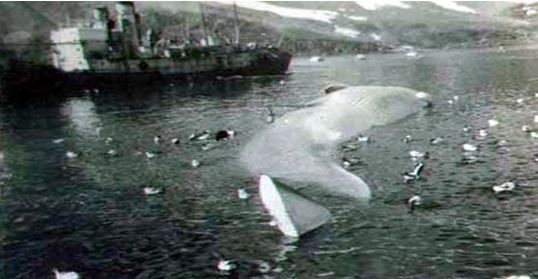
|
With the demise of the whaling on South Georgia, visitors
are no longer met by such appalling sights.
|
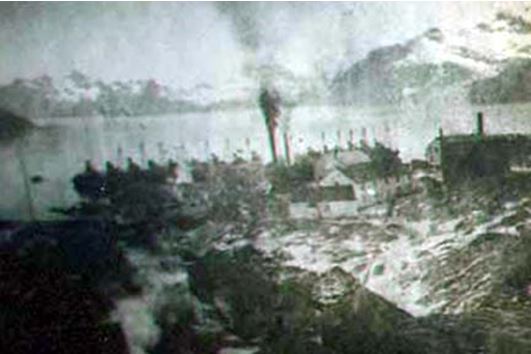
|
This photo of Leith Harbour shows the smoke from the
whaling factory where the blubber was boiled down.
|
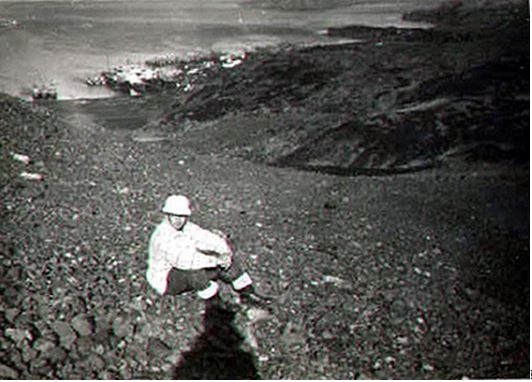
|
The harbour and town of the little whaling community can be seen
down the hill behind Dennis.
|
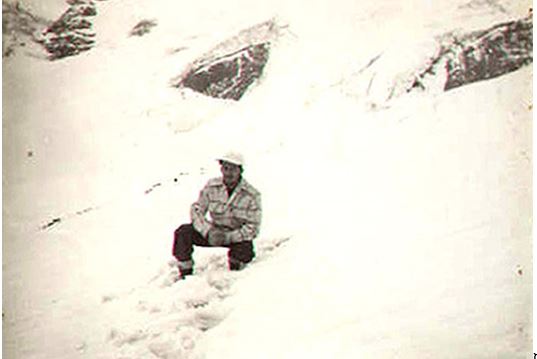
|
Dennis enjoyed the snow which is always a part of life on
subarctic
South Georgia, even in the summer.
|
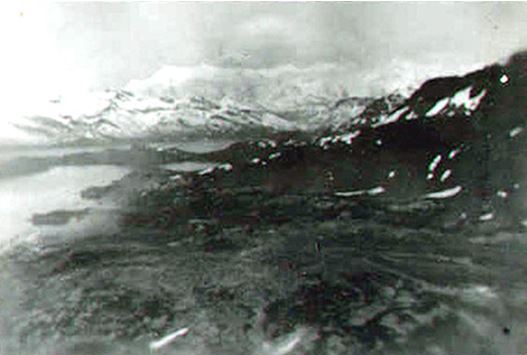
|
The view from the top was spectacular and
well worth the arduous climb!
|
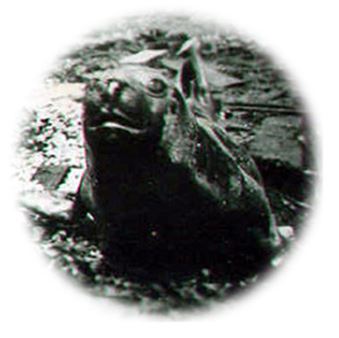
This friendly seal
didn't mind the stench.
|
The inhabitants of the island were mostly
British and
Norwegian.
However, it was very difficult to assess a persons age --
everyone had shoulder
length hair and a beard reaching down to his chest.
The only entertainment provided was that each night a movie was shown
in the small canteen.
With having only the one projector, a break of
several minutes took place between reels,
and not always were the reels shown in sequence! Needless to say,
the movies were for the most
part "ancient" to say the least.
To reach the canteen one was required to walk through most of the
operating installations gasping on that
damned smell of whale oil.
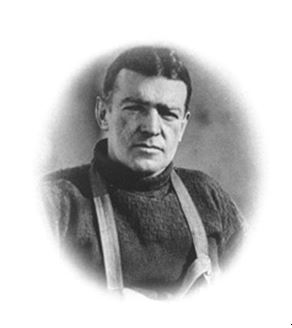
Sir Ernest H. Shackleton
(1874-1922)
|
In
May 1916
South Georgia played a part in one of the most incredible
survival stories of the 20th Century when the famous polar
explorer,
Sir Ernest Shackleton
and two members of his Antarctic Expedition,
Frank Worsley
and Tom Crean, successfully
crossed the uncharted and savage interior of the island
to get help at
Stromness for their stranded companions.
Six months earlier the expedition's ship,
Endurance,
had been crushed in the polar pack-ice, but
Shackleton, with the guidance of his superb navigator,
Frank Worsley,
had led his 27 men to the temporary safety of
Elephant Island,
off Antarctica's northern penninsula.
Knowing that they were all doomed without outside help,
Shackleton then set out with Worsley, Crean, and 3 others
in a tiny 22-foot
lifeboat, the James Caird,
and against all odds managed to cross
800 miles
of the world's most perilous ocean to
the uninhabited
northwest coast of South Georgia.
|
|
By completing the nearly impossible trek across South Georgia's
interior to Stromness,
Shackleton eventually succeeded in saving the lives of all his men.
He returned to South Georgia on
January 5th, 1922 determined to
make another attempt on Antarctica, but suffered a fatal attack
that same day.
The great explorer was buried
in the whalers' graveyard at
Grytviken, South Georgia.
|
|
Photo Source: E.H. Shackleton: The Antarctic Challenge
by Kim Heacox. National Geographic Society, Washington, 1999.
For more information please see the
Dulwich College's Sir Ernest Shackleton page.
|
After discharging our cargo of fuel oil,
we were destined to sail for the
River Plate in
Argentina to collect
a full cargo of Linseed Oil for
discharge in London.
To switch from Fuel oil to a cargo of
Linseed oil required
scrupulous cleaning of the tanks. This was our task for the
next three weeks. Each day, the Deck crew were down below deep
inside these massive tanks, crawling along beams and directing high
pressure steam hoses over every area of the tanks,
washing away all traces of the fuel oil, HOPEFULLY.
This was of course back breaking work, and at the end of the work day
when one emerged finally from the tank, covered in oil, soaking wet
through, hot and sweaty from the steam, but quickly becoming cold
upon climbing through the hatch onto the deck.
Needless to say, after a hot shower, one usually slept like a child.
After the thorough cleaning
of each tank, we were then required to spray the insides with a
white
limewash.
We had already sailed from South Georgia during this
time and
most of the above work had been carried out whilst at sea,
again plagued by the foul weather of "The Roaring Forties".
Finally, the day arrived that we entered harbour in
Buenos Aires.
Of course everyone was now looking forward to spending time ashore
in the
city. Most of the crew dressed up in their "Go ashore clothes"
and prepared for the bright lights. However,
as we approached the "Gangway" from the ship to the quay,
the Chief Mate greeted us (The Deck
Crew) informing us that the
Health Officials
had just been on board
to inspect the tanks, and had "failed" to pass them and that we were
required to "Turn To" and remedy the faults.
We were required to work through until the work was finished,
inspected and passed by the
Health Inspector's.
After much grumbling and disappointment and extracting a promise
from the First Mate that we be awarded a bonus eight hours
of overtime, plus a hefty tot of rum immediately upon completion,
we "Turned to" with a vengence, finally staggering exhausted
from the last
tank at 5 am. Filthy and sweaty, we knocked upon the door of the
Mate's cabin and when he opened his door, we informed him that we had
finished our part of our agreement, and now required that he do the
same. He came back to his door bearing a bottle of rum and we each
were
given a wineglass full. At that time it tasted like nectar!!
After this, the ship was very quickly loaded with
Linseed oil
and we sailed without incident homeward bound for London.
This voyage proved to be my last Foreign going trip to sea.
I decided to quit sailing and journeyed by train to
Schlutup-Lubeck,
in Northern
Germany to collect my German Wife
Anneliese and baby
Daugther Christine.
I had married there a couple of years before and now decided it
was way past the time for us all to be together.
After bringing them back with me to England, we lived for a year
there until finally emigrating to
Port Elizabeth in South Africa in 1951.
But, that is another story.
THE END
Dennis' pages are maintained by Maureen Venzi and are part of
The Allied Merchant Navy of WWII.
|



